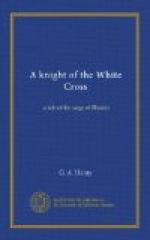“We have lost the day,” he said. “Warwick and Montague are both killed. All is lost here for the present. Which will you do, my love, ride with me to the West, where Queen Margaret will speedily land, if indeed she has not landed already, or take sanctuary here with the boy?”
“I will go with you,” she said. “I would vastly rather do so.”
“I will tell you more on the road,” he said. “There is no time to be lost now.”
The woman of the house was called, and at once set her son to saddle the other horse and to give a feed to that of the knight. Dame Tresham busied herself with packing the saddlebags while her husband partook of a hasty meal; and ten minutes after his arrival they set off, Gervaise riding behind his father, while the latter led the horse on which his wife was mounted. A thick mist hung over the country.
“This mist told against us in the battle, wife, for as we advanced our forces fell into confusion, and more than once friend attacked friend, believing that he was an enemy. However, it has proved an advantage to us now, for it has enabled great numbers to escape who might otherwise have been followed and cut down. I was very fortunate. I had left my horse at a little farmhouse two miles in the rear of our camp, and in the fog had but small hope of finding it; but soon after leaving the battlefield, I came upon a rustic hurrying in the same direction as myself, and upon questioning him it turned out that he was a hand on the very farm at which I had left the horse. He had, with two or three others, stolen out after midnight to see the battle, and was now making his way home again, having seen indeed but little, but having learned from fugitives that we had been defeated. He guided me to the farmhouse, which otherwise I should assuredly never have reached. His master was favourable to our party, and let the man take one of the cart horses, on which he rode as my guide until he had placed me upon the high road to St. Albans, and I was then able to gallop on at full speed.”
“And Warwick and his brother Montague are both killed?”
“Both. The great Earl will make and unmake no more kings. He has been a curse to England, with his boundless ambition, his vast possessions, and his readiness to change sides and to embroil the country in civil war for purely personal ends. The great nobles are a curse to the country, wife. They are, it is true, a check upon kingly ill doing and oppression; but were they, with their great arrays of retainers and feudal followers, out of the way, methinks that the citizens and yeomen would be able to hold their own against any king.”
“Was the battle a hard fought one?”
“I know but little of what passed, except near the standard of Warwick himself. There the fighting was fierce indeed, for it was against the Earl that the king finally directed his chief onslaught. Doubtless he was actuated both by a deep personal resentment against the Earl for the part he had played and the humiliation he had inflicted upon him, and also by the knowledge that a defeat of Warwick personally would be the heaviest blow that he could inflict upon the cause of Lancaster.”




